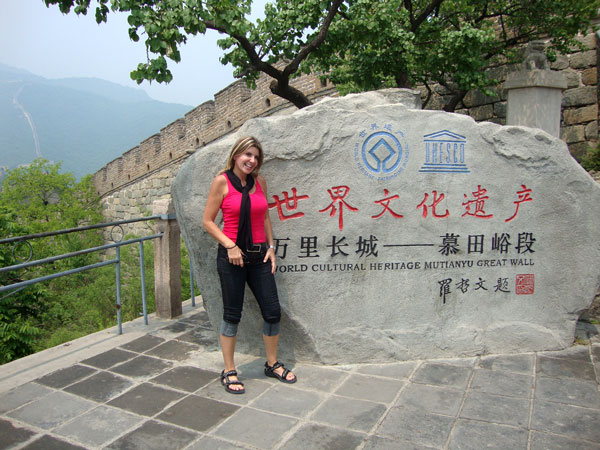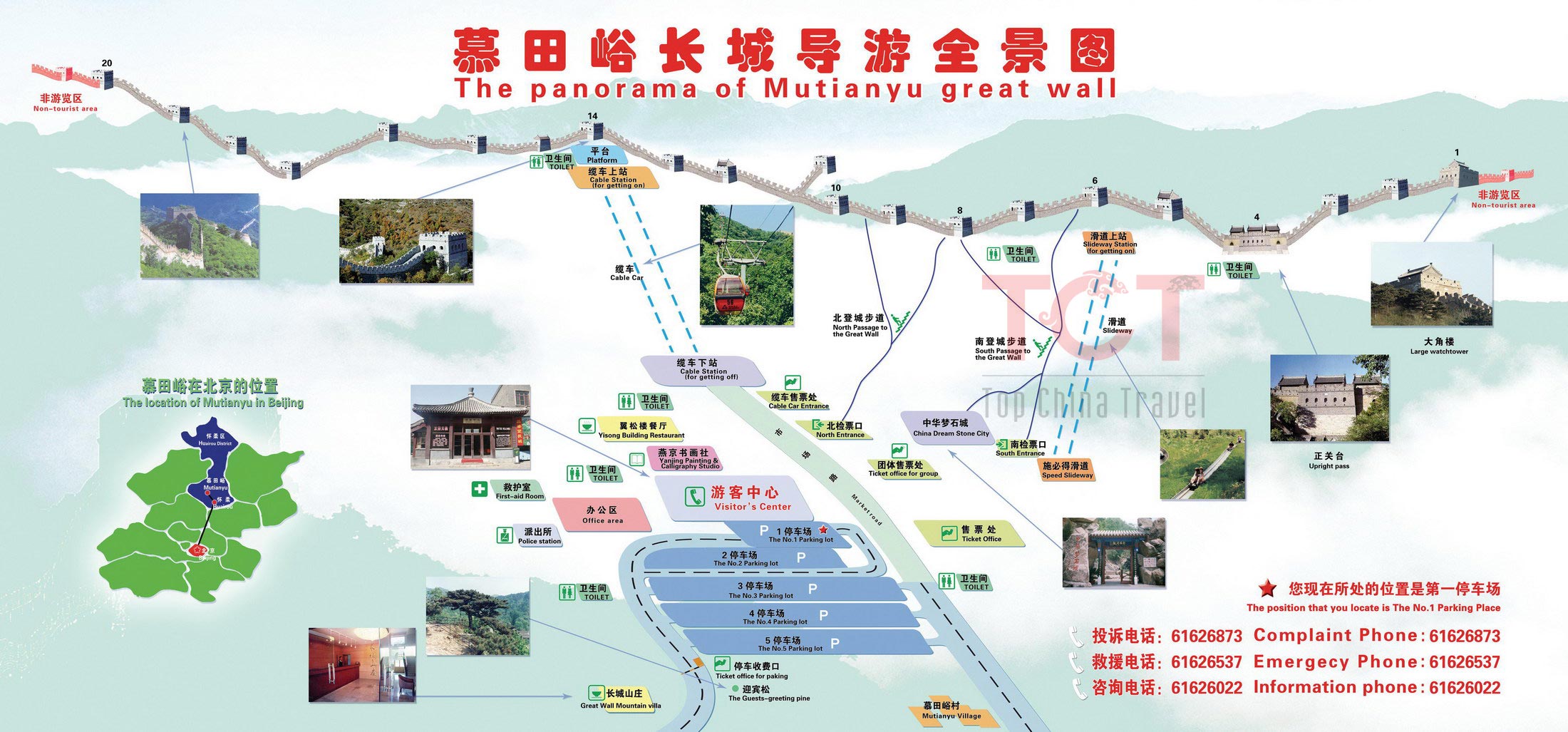Mutianyu Great Wall is located in Huairou District, Beijing, 73 kilometers away from Beijing downtown area. It is one of the famous sections of China Great Wall. Mutianyu Great Wall was first built in the mid-6th century during the Northern Qi, making it older than the Badaling section. In 1569, the Mutianyu Great Wall was rebuilt and till today most parts of it are well preserved. The Mutianyu Great Wall has the largest construction scale and best quality among all sections of Great Wall.
It is connected with Jiankou in the west and Lianhuachi and Jinshanling in the east. In 1569, the Mutianyu Great Wall was rebuilt, mainly with granite and is one of the best-preserved sections with the largest construction scale and best quality among all sections of Great Wall, being 7-8 meters high and 4-5 meters wide with 22 watchtowers on this 2,250-meter-long section. It served as the northern barrier defending the capital and the imperial tombs.
There are 22 watch towers distributed at close intervals along the wall. The watch towers at the Mutianyu Great Wall are spaced at short intervals.They are located not only in the main wall but also at the distinctive ‘branch cities’. Branch cities are built on the hill ridge against the inner or outer side of the wall. They measure from several yards to dozens of yards across. On the northwest over 3,281-feet hills, lies a section of the wall called ‘Ox Horn Edge’. On the steep and lofty peaks, there are two walls named ‘Flying Eagle Flies Facing Upward’ and ‘Arrow Lock’. What is more rarely seen on the southeast side is a general gateway platform guarded by three watch towers together. In locations of strategic importance, batteries are set up to reinforce the defense capabilities. Mutianyu Great Wall really deserves to be the archetype of the ten thousand li Great Wall.
Mutianyu Great Wall in winter
History of Mutianyu Great Wall
Mutianyu Great Wall was first built in the mid-6th century during the Northern Qi (A.D. 550- A.D. 577), older than the Badaling section of the Great Wall.
It was extended and restore in the early Ming Dynasty (1368-1644). The reconstruction took place under the supervision of General Xu Da, who was one of the founding generals of the Ming Dynasty. In 1404, a pass was built in the wall. During the reconstruction, he was responsible for construct a wall from Shanhaiguan in the east to as far as Mutianyu. The construction of it was to serve as a vital symbol of protection from marauding nomads to the north.
In 1569, the Mutianyu Great Wall was rebuilt on 1000 km of the wall. Qi Jiguang, who is an also one of the founding generals of the Ming Dynasty, was responsible for the project. He had built credentials fighting Japanese pirates. In addition, he took his responsibility as a builder quite seriously and he built the wall based on great military defense according to his experience. The construction took years to finish. As a fortification for many years, the wall was built up with solid granite blocks, as well as some of the larger defensive towers. After that, that wall is used to be military defense for many years, and there are soldiers guided on the wall.
The latest restoration of Mutianyu Great Wall took place from 1982 to 1986 by the Beijing government. But the reconstruction is not for defensive fortification, but was designated to be a national tourist attraction. It was great to show the world heritage to the world. The Great Wall is the crystallization of human wisdom. This great project should be present to the public. The Mutianyu Great Wall has the largest construction scale and best quality among all sections of Great Wall. Since then, Mutianyu Great Wall has attraction thousands of travelers every year.
TCT team visited to Mutianyu in 2013
Features
Built mainly with granite, the wall is 7-8 meters high and the top is 4-5 meters wide. Compared with other sections of Great Wall, Mutianyu Great Wall possesses unique characteristics in its construction.
► Watchtowers are densely placed along this section of the Great Wall – 22 watchtowers on this 2,250-meter-long stretch.
► Both the outer and inner parapets are crenelated with merlons, so that shots could be fired at the enemy on both sides – a feature very rare on other parts of the Great Wall.
► The Mutianyu Pass consists of 3 watchtowers, one big in the center and two smaller on both sides. Standing on the same terrace, the three watchtowers are connected to each other inside and compose a rarely seen structure among all sections of Great Wall.
► Among Great Wall section, it has the lowest elevation of the Great Wall, which make it rich in three-dimensional sense. Mutianyu has the lowest altitude of only 486 meters
► Mutianyu has a large area of vegetation. The vegetation coverage rate of it reaches 96% today. Such a large area of vegetation is not comparable to any section of the Great Wall sections. When the spring comes, the great wall is surrounded by green plants and colorful flowers, which looks amazing. Or if you want to see the large area of red leaves, you can go there in autumn.
Mutianyu Great Wall in Autumn
Tips for Mutianyu Tour
The best time to visit China Great Wall is in Spring and Autumn, especially in April, May, September or October, when has good weather and moderate climate.Now, Mutianyu Great Wall is a world-famous great wall section in Beijing.
To offer more convenient to the visitors, there are three ways of ascent and four ways of descent to choose from.
(1) Walking up the Great Wall along the stone steps (like a mountain hike – 30 minute hike) – to the 10th or 8th Watchtower;
(2) Except for the 4000 steps in the great wall, you can also take a two-rider chairlift or four-rider gondola up from the foothills to the top of the wall. They run long the ridges above. Taking a cable car up to the Great Wall – to the 14th Watch Tower; Taking a chairlift to the Great Wall – to the 6th Watch Tower.
(3) As for descent, you may use the above ways to do it, but you may also single-rider personal wheeled toboggan to descent. It allows single riders to descend from the wall to the valley on a winding metal track and of course, it is a fantastic thing to do!
Learn more about how to get to Mutianyu Great Wall from Beijing downtown.
Learn more about cable cars, toboggan or slide rails and the relevant ticket fares in Mutianyu Great Wall.
Map of the Mutianyu Great Wall
How to Explore Mutianyu Great Wall
【Visit some local art & craft village】
There are a couple of places for you to see the local art and craft, such as Village Art Garage or the Art Room. The Village Art Garage is located in Beigou Village and artists create in this place. There are frequent performances or exhibitions. There is a gallery that is usually open from 11:00 am to 3:00 pm on weekend or by appointment. If you are interested in them, you’d better contact them in advance. Here provides some classes to local schoolchildren or elderly folks in the village, if you are interested in learning to make local crafts, you may also contact them. In addition, the Art Room is a perfect place to go. Here off place for both dining and exhibition. And there are temporary exhibitions of artworks and craft in various media. With luck, you may find something to take home and show them to your families and friends.
【Hiking】
Another popular and interesting activity in Mutianyu Great Wall is hiking. Due to its proximity to the Jiankou Great Wall, the Mutianyu-Jiankou trail is becoming one of the most popular Great Wall hikes. As Jiankou is in a state of disrepair, this hike combines the preserved condition of Jiankou’s Great Wall with the classic restorative brickwork of Mutianyu. Tour to Mutianyu would not be complete without a hiking on the wall. While hiking, you can have a chance to see the local surrounding villages, as well as walk through the hilly orchards and mountainsides. This experience will not disappoint you.
The 22 watch towers of Mutianyu Great Wall are numbered from right (east) to left (west). The 22rd tower is highest point of the Mutianyu Great Wall. In any Great Wall hike, it is better exercise and good for your legs to hike upwards rather than to hike down. Do the opposite if you want to take things easier and more relaxed! But for good exercise hiking it is harder to hike the Mutianyu Great Wall from the left to the right (from the east to the west).
Note: Hiking with a guide to joining a group is not just good company, but direction. We advise a guide to offer necessary precautions when hiking in the wall area.
【Biking】
Biking in Mutianyu Great Wall is also a good choice for visitors. Biking on the smooth wide roads, one can breathe plentiful fresh air, and the mountains and village around the wall offer fantastic views for cyclists. If you are tired, you can have a refreshing stop for lunch and a drink at the Great Wall, or to buy crafts from local artisans and shopkeepers.


